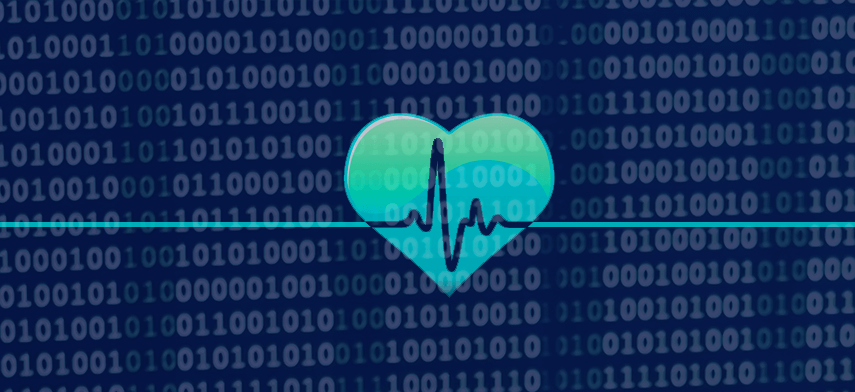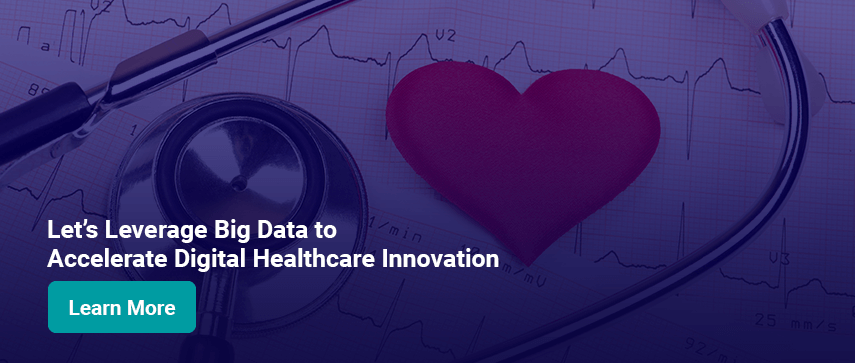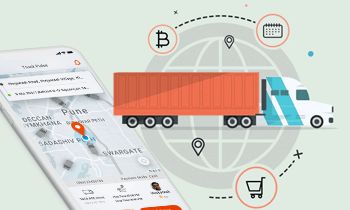“Big data is the next big thing” is a common statement now. From government agencies to private enterprises, organizations are reaping the various benefits of big data and analytics in their functions. Big data implies large and varied sets of data. The power and potential of big data are far-fetched and cannot be summarized in its definition. Around the globe, organizations are unleashing the potential of large volumes of data to gain relevant business insights and enhance operational efficiency.

It is no different in the healthcare sector. Data science in healthcare has started to garner attention from providers and life scientists everywhere. It is estimated that around 1.2 billion clinical documents are produced in the US every year which means there is an ocean of data for researchers in the healthcare sector. With the widespread use of wearable devices and large-scale adoption of EHR systems, the amount of data created each day is witnessing expeditious growth.
Healthcare organizations are on the track of harnessing the power of these enormous volumes of data to gain a deeper understanding of the human body and reap its numerous benefits. By taking advantage of innovative techniques in data mining and analytics, big data has the power to revolutionize the healthcare sector. Here, we explore the different fields that are forerunners of big data in healthcare.
Big Data and Data Science in Healthcare
Big data in healthcare refers to the enormous volumes of data that is available for healthcare providers post the advent of digitization in the sector. Systematic analysis of these data sets can provide actionable insights and help in taking strategic decisions on matters related to the healthcare system. It helps to create comprehensive and holistic views of the patient, consumers, and physicians. Data-driven decision making opens up new opportunities in improving the quality of healthcare.
Interesting Read: How to Unlock the Full Potential of Patient-Generated Health Data (PGHD)?
As goes the old saying, prevention is better than cure. This longstanding mission of the healthcare systems becomes an easier one when healthcare data science is put into action.
Explore 14 Use Cases of Data Science in Healthcare

Among various industries, healthcare is considered to be the largest beneficiary of big data and analytics. From saving lives to cutting down costs involved, data science has a huge role to play in the healthcare system. Listed below are a few handpicked data science use cases in healthcare.
Improve Diagnostic Accuracy
A recent survey has pointed out that 12 million adult patients in the US are misdiagnosed each year and 10% of deaths occur due to diagnostic errors. By unlocking the power of big data and analytics, healthcare providers can improve diagnostic accuracy and decrease mortality rates.
Many data analytics companies now offer solutions to providers by making use of innovative data science technologies and machine learning algorithms to improve diagnostic accuracy. Predictive analytics methods analyze the historical data including patient data, clinical notes, symptoms, habits, diseases, genome structure, etc. to accurately predict the outcomes.
Make Use of EHR More Effective
Electronic Health Records are the systematic collection of patient data in digital format which can be made accessible anytime for authorized users. According to the latest data available, more than 95% of hospitals and nearly 90% of office-based physicians have already adopted an EHR system. The availability of digital versions of patient information has been a revolutionary change in the healthcare industry, and perhaps one of the widespread applications of big data.
Interesting Read: What is PHI and What is Not?
EHR adoption has far-fetched benefits like cutting overheads, improving the quality of healthcare, and streamlining operations. A report from McKinsey titled ‘The Big Data Revolution in US Healthcare-Accelerating Value and Innovation’ refers to the example of HealthConnect that ensures data exchange across all medical facilities and promotes the use of EHR. This integrated computer system employed by Kaiser Permanente has improved outcomes in cardiovascular disease and saved about a billion dollars due to reduced office visits and lab tests.
Analyze Medical Images Efficiently
Another major area that benefits out of big data and analytics is medical imaging. It is estimated that each year about 600 million imaging procedures are performed in the US alone. It is hardly possible to store all this data manually without digital storage systems.
The deep-learning algorithms are used to figure out the difference in modality, resolution, dimension of medical images obtained through X-ray, mammography, tomography, and other medical imaging techniques. This helps physicians to improve diagnostic accuracy, detect diverse conditions, and assist in finding better treatment options. Data science technologies are already being used in detecting tumors, artery stenosis, organ delineation, etc.
Create Effective Pharmaceutical Drugs in a Shorter Period
Finding a new pharmaceutical drug requires multiple processes and numerous testings, and a lot of time and money. It takes 12 years and US$350 million for a new drug to reach to the pharmacy from the lab. With the advent of big data analytics, researchers can simplify and shorten this process.
Data analytics and machine learning algorithms assist the research groups by giving a data-driven perspective in every step of the process. It is capable of predicting the success rate and how the compound will act in the human body leading to higher accuracy in drug discovery.
Furthermore, computational drug discovery is combined with genetic research to understand how chemical compounds react to possible combinations of different cell types, genetic mutation, etc. Thus, data science applications are a catalyst to a new era of pharmaceutical research.
Reduce Risks in Prescription Medicine
Apart from contributing to diagnostic accuracy, data science technology is helping to reduce the risks involved in prescription medicine as well. When a drug is prescribed to the patient, deep-learning algorithms verify it with the available databases and alert the physician if it deviates from the standard treatment procedures. This benefits the healthcare provider by enhancing better health outcomes and avoiding lethal complications associated with faulty prescriptions.
To Trigger Real-time Alerts
As we have acknowledged it, in-house treatment is a costly affair, but monitoring health statistics of the patient is much-needed for enhanced care. With the advent of wearable devices, it becomes possible for doctors to monitor the vital statistics of the patient virtually and provide real-time medical assistance when needed.
The wearable devices will collect patient data and store it in the cloud, which is accessible for the care managers and providers. For example, when there is an alarming change in the blood pressure of a patient, the system alerts the physician who can take appropriate action to save the patient.
Improve Patient Engagement
Today’s healthcare organizations follow a value-based care approach, and patient engagement plays a significant role in it. Hence it has become a top priority for healthcare providers to increase patient participation in the treatment plan. They invest primarily in developing strategies to meet the expectations of the tech-savvy patient community.
Big data analytics can be effectively put into action by healthcare providers to ensure that patients actively participate in their care. Machine learning, artificial intelligence, and natural language processing can be used to draw actionable insights and develop predictive risk scores to improve care coordination. It primarily works with people who undergo chronic disease management plans.
Interesting Read: What Is Patient Engagement and Why Does It Matter in Healthcare?
Streamline Knowledge Management
Problem-solving and reaching optimal results in healthcare largely depend on the knowledge bank. In the current healthcare landscape, it is a challenge for the provider to manage both internal knowledge and externally acquired knowledge effectively. To provide the best possible treatment, reach operational excellence, and boost innovation, an effective knowledge management strategy is essential.
With the incorporation of big data in healthcare, it becomes easier to gather, store, and distribute various medical facts. Data science tools are capable of integrating information from multiple sources and providers can make use of analytics to reach optimal operational results.
Simplify Internal Staffing Process
Staff managers in any healthcare organization find it challenging to determine the number of staff required at any given time. If the number of staff is more than what is needed, it contributes to loss of labor, and it leads to poor customer service reviews if the staff is less. By taking advantage of predictive analysis, it is possible to determine how many patients would be at the hospital daily and even hourly. This helps to streamline the whole process of staff management which leads to reduced waiting time for patients and improved quality of care.
Reduce Visits to Doctor
With the help of artificial intelligence, mobile applications are capable of providing necessary healthcare support now. Patients can describe the symptoms, ask queries, and take tips and suggestions from the intelligent chatbots anytime instead of waiting for the doctor’s appointment. It gives timely reminders about the medicines and treatment strategies and even helps in fixing an appointment with the doctor.
AI-based apps are beneficial for both patients and physicians. While it saves time for physicians and they can attend more critical cases, patients get round-the-clock assistance. It assists the patient in following a healthy lifestyle which eventually leads to better health outcomes.
Explore: Doctor Appointment Scheduling Solution
Find a Cure for Deadly Diseases
One of the many potential applications of data science in healthcare is in finding medication for deadly diseases like cancer, Ebola, etc. There is an enormous amount of data on treatment plans, recovery rates, symptoms of diseases, mortality, etc. available for researchers. By using data analytics technology, they can find the trends and treatments that offer high success rates in the real world. For example, drug researchers can analyze how certain mutations and cancer proteins interact and find the best combination that will save the patient.
Improve Cyber Security
Healthcare data is highly prone to data breaches because personal data includes Social Security Number, Medicare information, etc.which is lucrative in the black markets. Consequently, ensuring cyber security of health data is a massive challenge for any healthcare organization. Many healthcare providers are employing data analytics tools to identify changes in network traffic or detect the occurrence of a cyber attack. Furthermore, big data helps in streamlining the insurance claim process leading to faster and better returns for the patient while identifying fraudulent and inaccurate claims.
Summing Up!!
Healthcare systems are always in search of better solutions to improve the quality of care. It has timely embraced newer technologies and keeps evolving for a better future. Big data in healthcare is a revolution in the making. It has just started to transform the way patients, physicians, and healthcare organizations approach to care delivery. The uses of big data discussed above are just the tip of the iceberg.
With a massive amount of data created each day, big data and analytics are all set to become the transformational wave in the field of healthcare. Healthcare data is estimated to grow faster than in manufacturing, financial services, or media. It is expected to clock the compound annual growth rate of 36% through 2025. Perhaps, there is no way that organizations can ignore the power and potential of big data and analytics in healthcare.
Has your organization begun to leverage the power of big data? Contact us today for building data-driven healthcare solutions for optimum results.

Author's Bio

Shailendra Sinhasane (Shail) is the co-founder and CEO of Mobisoft Infotech. He has been focused on cloud solutions, mobile strategy, cross-platform development, IoT innovations and advising healthcare startups in building scalable products.


